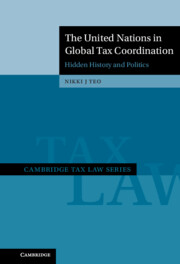Book contents
- The United Nations in Global Tax Coordination
- Cambridge Tax Law
- The United Nations in Global Tax Coordination
- Copyright page
- Contents
- Foreword
- Preface
- Acknowledgements
- Chronology of Key Events
- Archival Sources
- Abbreviations
- 1 Introduction
- 2 Prelude to Global Tax Coordination
- 3 Creation of the Fiscal Commission (1943–1946)
- 4 Pax Americana, Cold War and Decolonisation
- 5 First Session of the Fiscal Commission and Aftermath (1947)
- 6 Related Intervening Developments (September 1947–November 1948)
- 7 Second Session of the Fiscal Commission and Aftermath (1949)
- 8 Related Intervening Developments (January 1949–April 1951)
- 9 Third Session of the Fiscal Commission and Aftermath (1951)
- 10 Related Intervening Developments (May 1951–April 1953)
- 11 The Taxation of International Air Transport and Contending with ICAO (1947–1951)
- 12 Fourth Session of the Fiscal Commission and Aftermath (1953)
- 13 Dissolution of the Fiscal Commission and Birth of the OEEC Fiscal Committee
- 14 Conclusion
- Book part
- Select Bibliography
- Index
10 - Related Intervening Developments (May 1951–April 1953)
Published online by Cambridge University Press: 24 March 2023
- The United Nations in Global Tax Coordination
- Cambridge Tax Law
- The United Nations in Global Tax Coordination
- Copyright page
- Contents
- Foreword
- Preface
- Acknowledgements
- Chronology of Key Events
- Archival Sources
- Abbreviations
- 1 Introduction
- 2 Prelude to Global Tax Coordination
- 3 Creation of the Fiscal Commission (1943–1946)
- 4 Pax Americana, Cold War and Decolonisation
- 5 First Session of the Fiscal Commission and Aftermath (1947)
- 6 Related Intervening Developments (September 1947–November 1948)
- 7 Second Session of the Fiscal Commission and Aftermath (1949)
- 8 Related Intervening Developments (January 1949–April 1951)
- 9 Third Session of the Fiscal Commission and Aftermath (1951)
- 10 Related Intervening Developments (May 1951–April 1953)
- 11 The Taxation of International Air Transport and Contending with ICAO (1947–1951)
- 12 Fourth Session of the Fiscal Commission and Aftermath (1953)
- 13 Dissolution of the Fiscal Commission and Birth of the OEEC Fiscal Committee
- 14 Conclusion
- Book part
- Select Bibliography
- Index
Summary
Private industry interests castigate underdeveloped countries’ resistance to offering special tax incentives to foreign firms. Momentum gathers in the Americas and in the United Nations for developed countries to exempt the taxation of foreign investment income to encourage the flow of private capital to underdeveloped areas. The United States leaves economic aid to developing countries to the sphere of private enterprise. The Soviet Union begins providing aid to and forming trade relations with Asian and Arab nations. British foreign economic policy reorientates away from the Empire and Commonwealth and towards North America and Europe.
Keywords
- Type
- Chapter
- Information
- The United Nations in Global Tax CoordinationHidden History and Politics, pp. 235 - 251Publisher: Cambridge University PressPrint publication year: 2023

